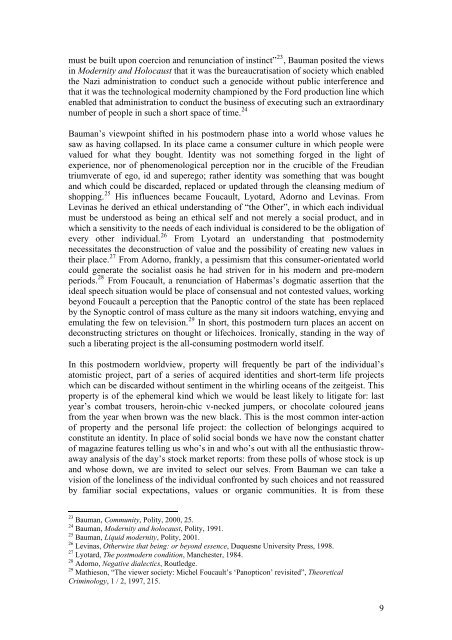The Unbearable Lightness of Property - alastairhudson.com
The Unbearable Lightness of Property - alastairhudson.com
The Unbearable Lightness of Property - alastairhudson.com
You also want an ePaper? Increase the reach of your titles
YUMPU automatically turns print PDFs into web optimized ePapers that Google loves.
must be built upon coercion and renunciation <strong>of</strong> instinct” 23 , Bauman posited the views<br />
in Modernity and Holocaust that it was the bureaucratisation <strong>of</strong> society which enabled<br />
the Nazi administration to conduct such a genocide without public interference and<br />
that it was the technological modernity championed by the Ford production line which<br />
enabled that administration to conduct the business <strong>of</strong> executing such an extraordinary<br />
number <strong>of</strong> people in such a short space <strong>of</strong> time. 24<br />
Bauman’s viewpoint shifted in his postmodern phase into a world whose values he<br />
saw as having collapsed. In its place came a consumer culture in which people were<br />
valued for what they bought. Identity was not something forged in the light <strong>of</strong><br />
experience, nor <strong>of</strong> phenomenological perception nor in the crucible <strong>of</strong> the Freudian<br />
triumverate <strong>of</strong> ego, id and superego; rather identity was something that was bought<br />
and which could be discarded, replaced or updated through the cleansing medium <strong>of</strong><br />
shopping. 25 His influences became Foucault, Lyotard, Adorno and Levinas. From<br />
Levinas he derived an ethical understanding <strong>of</strong> “the Other”, in which each individual<br />
must be understood as being an ethical self and not merely a social product, and in<br />
which a sensitivity to the needs <strong>of</strong> each individual is considered to be the obligation <strong>of</strong><br />
every other individual. 26 From Lyotard an understanding that postmodernity<br />
necessitates the deconstruction <strong>of</strong> value and the possibility <strong>of</strong> creating new values in<br />
their place. 27 From Adorno, frankly, a pessimism that this consumer-orientated world<br />
could generate the socialist oasis he had striven for in his modern and pre-modern<br />
periods. 28 From Foucault, a renunciation <strong>of</strong> Habermas’s dogmatic assertion that the<br />
ideal speech situation would be place <strong>of</strong> consensual and not contested values, working<br />
beyond Foucault a perception that the Panoptic control <strong>of</strong> the state has been replaced<br />
by the Synoptic control <strong>of</strong> mass culture as the many sit indoors watching, envying and<br />
emulating the few on television. 29 In short, this postmodern turn places an accent on<br />
deconstructing strictures on thought or lifechoices. Ironically, standing in the way <strong>of</strong><br />
such a liberating project is the all-consuming postmodern world itself.<br />
In this postmodern worldview, property will frequently be part <strong>of</strong> the individual’s<br />
atomistic project, part <strong>of</strong> a series <strong>of</strong> acquired identities and short-term life projects<br />
which can be discarded without sentiment in the whirling oceans <strong>of</strong> the zeitgeist. This<br />
property is <strong>of</strong> the ephemeral kind which we would be least likely to litigate for: last<br />
year’s <strong>com</strong>bat trousers, heroin-chic v-necked jumpers, or chocolate coloured jeans<br />
from the year when brown was the new black. This is the most <strong>com</strong>mon inter-action<br />
<strong>of</strong> property and the personal life project: the collection <strong>of</strong> belongings acquired to<br />
constitute an identity. In place <strong>of</strong> solid social bonds we have now the constant chatter<br />
<strong>of</strong> magazine features telling us who’s in and who’s out with all the enthusiastic throwaway<br />
analysis <strong>of</strong> the day’s stock market reports: from these polls <strong>of</strong> whose stock is up<br />
and whose down, we are invited to select our selves. From Bauman we can take a<br />
vision <strong>of</strong> the loneliness <strong>of</strong> the individual confronted by such choices and not reassured<br />
by familiar social expectations, values or organic <strong>com</strong>munities. It is from these<br />
23 Bauman, Community, Polity, 2000, 25.<br />
24 Bauman, Modernity and holocaust, Polity, 1991.<br />
25 Bauman, Liquid modernity, Polity, 2001.<br />
26 Levinas, Otherwise that being: or beyond essence, Duquesne University Press, 1998.<br />
27 Lyotard, <strong>The</strong> postmodern condition, Manchester, 1984.<br />
28 Adorno, Negative dialectics, Routledge.<br />
29 Mathieson, “<strong>The</strong> viewer society: Michel Foucault’s ‘Panopticon’ revisited”, <strong>The</strong>oretical<br />
Criminology, 1 / 2, 1997, 215.<br />
9













